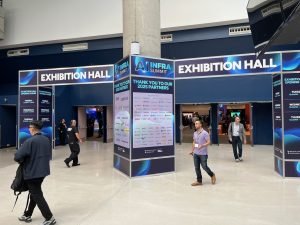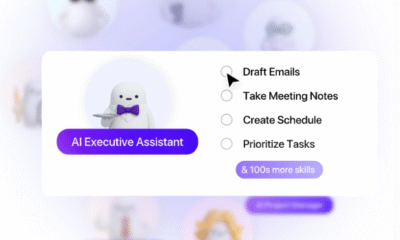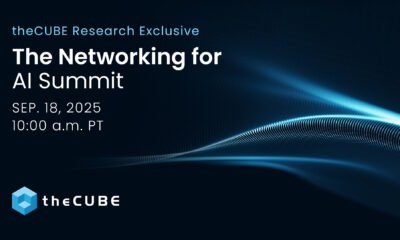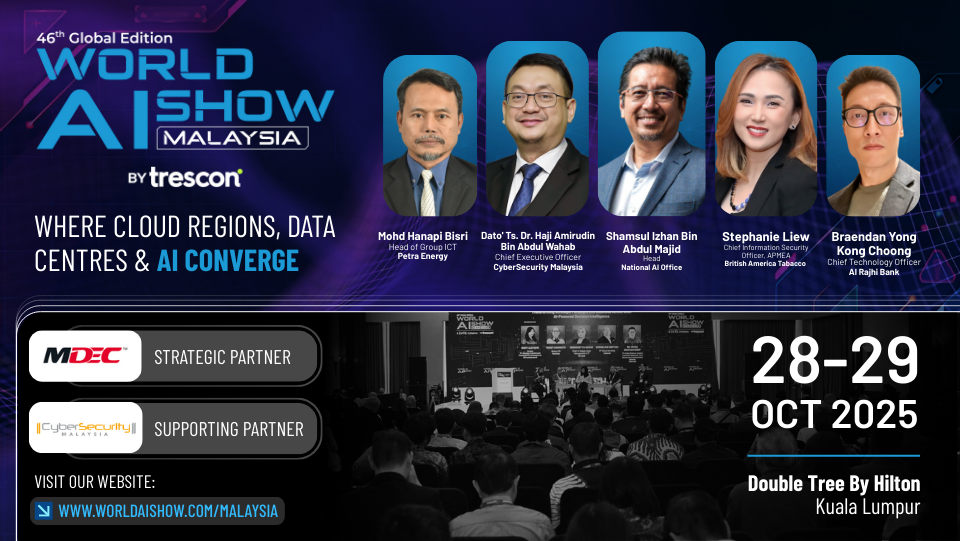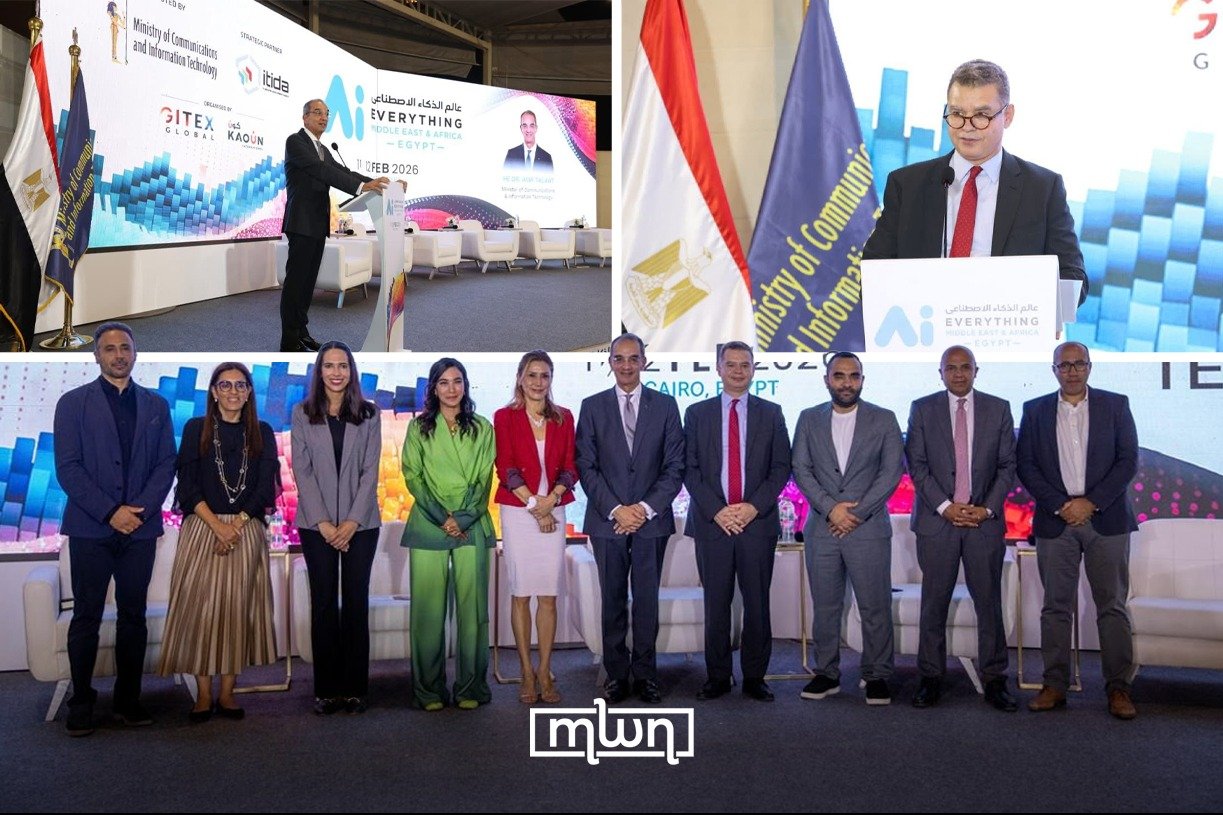Kuala Lumpur, Malaysia, Sept. 12, 2025 (GLOBE NEWSWIRE) — The World AI Show is back for its 46th global edition, happening on 28–29 October 2025 at DoubleTree by Hilton, Kuala Lumpur. Powered by a strategic partnership with the Malaysia Digital Economy Corporation (MDEC), this year’s summit promises to be a premier destination for leaders in AI, cloud, and digital transformation.
MDEC’s involvement highlights Malaysia’s bold digital vision. With the MyDIGITAL Blueprint and a renewed National AI Strategy in motion, the country is positioning itself as the AI hub of Southeast Asia. The World AI Show will bring together policymakers, innovators, business leaders, and investors to discuss how AI and cloud technologies can drive Malaysia’s digital economy forward.
The timing could not have been better. With billions being invested into cloud regions, data centres, and AI infrastructure, Malaysia is fast becoming a key destination for technology, innovation, and growth.
“The advent of AI—particularly Generative AI—has further enabled the transformation of digital ambitions into digital realities,” said Tze Phei Tee, Group Chief Information Officer at Wasco Berhad. “For a high-potential country like Malaysia, now is the time to leverage AI and data more effectively to build a business-friendly ecosystem.”

The summit’s agenda is built around practical, high-impact themes, from advancing Malaysia’s National AI Strategy to driving digital transformation in critical sectors like financial services, healthcare, and manufacturing. Attendees can expect deep dives into the actionable steps required to deploy AI, build data infrastructure, and navigate the ethics of responsible adoption. For investors and VCs, the event will also feature the FutureTech World Cup, a global startup competition where promising AI ventures will pitch for funding and partnerships.
Featured Speakers
As of now, industry leaders confirmed to speak include:
- Shamsul Izhan Bin Abdul Majid, Head, National AI Office – Malaysia
- Dato’ Ts. Dr. Haji Amirudin Bin Abdul Wahab, Chief Executive Officer, CyberSecurity Malaysia
- Stephanie Liew, Chief Information Security Officer, APMEA, British American Tobacco (BAT)
- Mohd Hanapi Bisri, Head of Group ICT, Petra Energy
- Aaron Kee, Chief Business Officer, Carsome Group
- Braendan Yong Kong Choong, Chief Technology Officer, Al Rajhi Bank
- SK Joo, Chief Technology Officer, Senheng Electric (KL) Sdn. Bhd.
- Tze Phei Tee, Group Chief Information Officer, Wasco Berhad
- TAN NGOH LIM, Head of Group Digital & Technology, Sarawak Economic Development Corporation (SEDC)
- Frank Kang, Country Head – Malaysia, Antler
- Weisheng Neo, General Partner, Qualgro
(More regional and global leaders will be announced in the coming weeks.)
Partners & Exhibitors
World AI Show Malaysia is, as of now, supported by leading partners and organisations:
- Strategic Partner: Malaysia Digital Economy Corporation (MDEC)
- Supporting Partner: CyberSecurity Malaysia
- Gold Parner: Magure
- Exhibitors: Xtremax, Cloocus Malaysia, Cognitus Asia Sdn Bhd
- Association Partners: Starfindo, Kumpul
(Additional partners and exhibitors will be revealed soon.)
What to Expect: High-Stakes Connections and Strategic Opportunities
The summit isn’t just a series of talks; it’s a high-value platform designed for actionable outcomes. The agenda is packed with formats built for engagement and deal-making, including:
- Keynote Discussions: Hear firsthand insights from global and regional AI pioneers.
- Panel Discussions & Fireside Chats: Participate in open dialogues about the real-world challenges of AI adoption and workforce readiness.
- Investor Showcases: Witness the next wave of AI innovation as startups pitch their transformative solutions directly to investors.
- Executive Roundtables: Join exclusive, closed-door discussions to forge strategic collaborations with top-tier executives.
- Curated Networking Functions: Build targeted partnerships and explore new business opportunities.
For any organization operating in the tech space, the World AI Show Malaysia offers unmatched strategic value by providing a direct line to:
- Technology Leaders: Showcase and demonstrate next-gen solutions to a captive audience of enterprise decision-makers.
- Solution Providers: Secure a strong foothold in Malaysia’s rapidly evolving AI and cloud ecosystem.
- Investors: Gain exclusive access to a curated pipeline of investment opportunities across ASEAN’s digital economy.
- Enterprise Executives: Benchmark and evaluate ROI-driven AI deployments and digital transformation strategies.
- Academia & Research Bodies: Collaborate with industry leaders on applied innovation and cutting-edge research.
“As we host the 46th global edition of the World AI Show in Malaysia, it underlines the country’s rising stature as a regional hub for cloud and AI innovation,” said Mithun Shetty, Vice Chairman of Trescon. “This edition will serve as a powerful enabler of partnerships and growth across the ecosystem.”
Secure your place at the heart of Malaysia’s AI revolution. The future of ASEAN’s digital economy is being written now—ensure your organization is part of the story.
For free delegate passes: click here
For sponsorship opportunities, speaking engagements, or attendance information, please contact:
Shrikanth Prabhu
Commercial Director
Email: prabhu@tresconglobal.com
Mobile: +91 8660115892
About Trescon
Trescon is a global business events and consulting firm specialized in producing highly focused B2B events that connect businesses with opportunities through conferences, expos, investor connect, and consulting services.
For more information, visit: www.tresconglobal.com
Media Contact:
Utkarsh Pant
Marketing Manager
Email: utkarsh@tresconglobal.com
Mobile: +91 99994 62605
PR Contact:
ZEX PR WIRE
info@zexprwire.com


